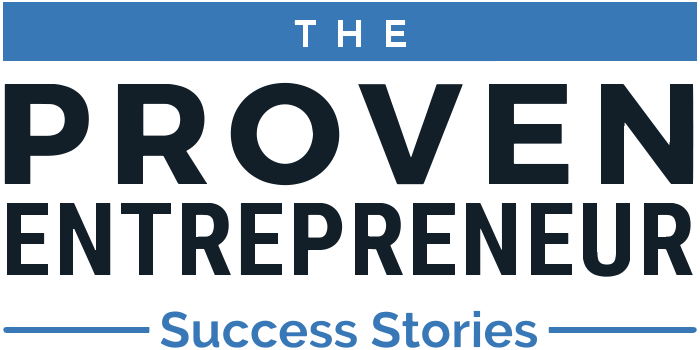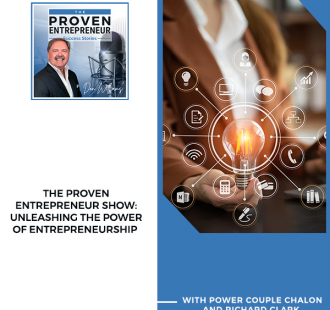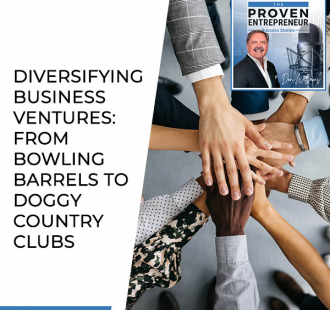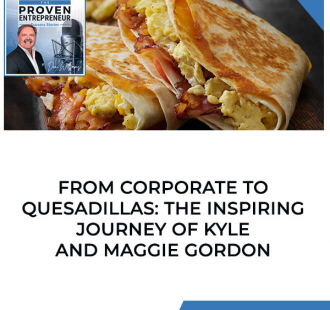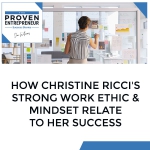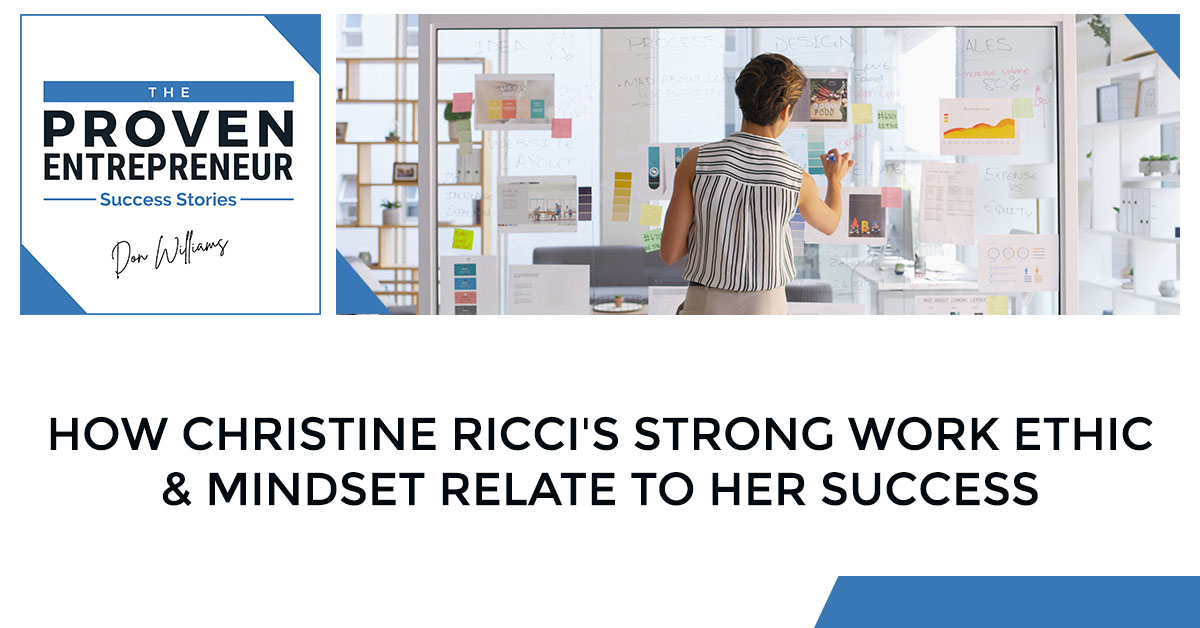
When you have a strong work ethic and mindset, you won’t be working for money. Instead, you’d be doing it because you love helping people. Christine Ricci, an Associate Broker and founder of the Ricci Team at Keller Williams NY Realty, began her career in real estate at a very young age. Throughout her more than twenty years of service, she has maintained top producer status selling over a billion dollars’ worth of real estate in the Westchester County, NY, and Fairfield, Connecticut marketplace. All this success comes from the basic principle of appreciating every opportunity. Why? Because each is a stepping stone to the next one. Tune in!
—
Listen to the podcast here
How Christine Ricci’s Strong Work Ethic & Mindset Relate To Her Success
I have a great entrepreneur as a guest. I have Christine Ricci. She has been in the real estate business since she was about seven. For most of that, she has been with Keller Williams, which is probably the worldwide leader in real estate brokerage. She is a real estate agent and a broker. Christine, welcome to the show.
Thank you, Don. It’s a pleasure to be on your show with you. It’s an honor.
I’m thrilled to have you. Let’s jump right into it. Think back to young little Christine, where you were born and raised and how you were raised. I know that you served all of New York and Connecticut, but I don’t think you’re from there. Where are you from?
My parents came from Portugal. They arrived here in 1971. My two older sisters were born there and my mom was pregnant with me. I was made in Portugal and was born in the USA. They landed from Portugal to New Rochelle, which is a city in Westchester County. I was born and raised in Westchester my entire life. I was a daughter of immigrants who came here like many to have a better life and live the American Dream and provide more to their children that they didn’t have. I grew up very cultural. I speak Portuguese, Spanish and English. I grew up with a European background here locally. They instilled all the values and culture in all my sisters and me.
Were your parents entrepreneurial?
They were not. My dad always was a dreamer and a visionary. Can you say he was an entrepreneur? He had an entrepreneur mindset and always was able to negotiate and create opportunities but he never owned his own business or anything, but he did have that mindset though.
Many immigrants to this country bring this phenomenal work ethic. Most of us are from somewhere else in this country, but after multi-generations of being in the United States, sometimes that work ethic wanes a little bit. Talk about mom and dad’s work ethic.
Negotiate and create opportunities.
Many come here with a work ethic that’s beyond what we see. My sisters and I were very fortunate that my parents did a very good job transferring that to us. Nothing was beneath them. If they had to lay brick, they would lay the best bricklayer. If they had to roll out the garbage or clean toilets, everything that they did, it was 150%. Their delivery of service and product was always beyond. They always wanted to exceed expectations.
That work ethic was transferred to us. That is one of the blessings of having parents that didn’t come from much. They appreciated every opportunity and never said, “No.” They looked at it like it was a stepping stone to the next one. It wasn’t like, “I’m not doing that.” It was more, “Let me do this. I don’t know who this person is, but maybe they can get me further.” It’s a great thing that my sisters and I were all very successful in a different way. We have those values. We’re all about people and delivering and exceeding expectations.
Exceeding expectations is straight out of my book, Romancing Your Customer, delivering exceptional experiences to where customers not just like you but love you, and say, “Wow,” when they deal with you. The other thing about, “They always said, yes,” what I love about that is I’m a firm believer that all progress starts with yes. Sometimes catastrophes can be averted with a no, but progress does not start with a no. Progress starts with a, “Yes, I’ll go. I appreciate the opportunity.” Maybe it goes as well as somebody thought and maybe not, but all progress starts with yes. Let me ask you, were you a childhood entrepreneur?
When I was six, my friend and I have a wild imagination. We would make mud pies and pretend to sell them. We would go buy products in the little deli near us. We would put a table out at the end of our driveway and start selling it for maybe a nickel more. I can say yes. I went to school to be a nurse. I always had a servant’s heart, always about serving and helping. When I went to school, I had my family very young. I was a young mom. When one of my friends said, “You would be a great real estate agent.” I’m like, “What’s that?”
I worked at an ice cream store. My sister and I delivered newspapers. I was 9 and she was 12. We did have that go-getter mentality. Our parents are always like, “Don’t let anything stand in your way.” I could say yes to that. The nurse came from the nurturing side of me. I love helping people. Medically, that was the nurse part. Now, it’s service-driven and helping people find their dream homes that they could build memories in. I get the same reward as if I was helping somebody medically. That’s where it transferred to, the helping.
It’s very common with entrepreneurs. One, maybe they had something in their childhood that was entrepreneurial. I certainly think that marketing mud pies qualifies as entrepreneurial, a little low on product quality, but real big on gusto. The other commonality is coming from a place of a servant’s heart of, “I want to help people achieve their dreams.” Like Zig said, “If you help enough other people get what they want, you can get what you want.” In that between time from young little Christine to grown-up Christine, you went to college, military or Merchant Marine. What was your path?
I finished high school. I always wanted to be a young mom from a little girl. I remember one of my best friend’s moms with curly, blonde hair, reading the books. My parents didn’t have that. They didn’t come into school. They didn’t speak English. They didn’t come for teacher conferences. I was always in awe that I wanted to be that mom that goes in and reads to their children in the class. I wanted to have the opportunity to be a stay-at-home mom. My mom didn’t.

I was working at an ice cream store for many years. I got married at 19, had my first son at 21. I did go to nursing school during that time. I was at my clinical stage when I found out I was expecting. I did not finish my RN. I was in my clinical phases when I phased out. I raised my children. I have three children, Fabio, Mark and Briana. At the age of 27, I was introduced to real estate. Since then, I’ve been a real estate agent.
Let’s talk about your business. What’s the name of your business?
We’re at Keller Williams, NY Realty, and it’s The Ricci Team. We are a team of thirteen. We do have a full staff, a Director of Operations, Kate, a Transaction Client Care Director who manages is our clients and the care of them, Nicole, an Executive Assistant, and many virtuals that help us with some odds and ends in marketing and eleven agents.
Would you hazard a guess, how many real estate agents exist in the United States?
That’s a great number to know. I don’t know. We have over 6,000 in one board and then another, probably 5,000 in Fairfield.
Are those the county boards?
Yes. There are quite a few numbers. The statistics are that only 20% or 25% of real estate agents get their license to sell eight houses a year and they stay in real estate, the go-getter, the go deliver service before you get compensated. There are a lot of hobbyists out there, too. It’s very interesting to see how the industry has changed since I got licensed. When I got licensed, it was more, “I’m doing it part-time.”
Appreciate every opportunity because each is a stepping stone to the next one.
A teacher would get their license on the side. Firefighters, stay-at-home moms, it was a hobby. It wasn’t looked at as a career in the last few years. We now see in universities Real Estate classes, real estate what you could do for a living, career paths in real estate and investment. It’s different. We have students coming out of college with their majors in Real Estate. We didn’t have that before. It was more, “Go to school and get your 75 hours.” It’s very easy to get a license but it’s not easy to be successful.
You all pay attention to that. It’s not easy to be successful. I’m in Texas and on the insurance side, there are 300,000 insurance licenses in the state of Texas for 33 million people. That seems like a lot of players in the game, though insurance is very parallel to real estate. The mass majority do little to no business. The majority of the business used to be what they called the 80/20 rule, 20% of people do 80% of the business. Maybe that’s more the 90/10 rule, 10% of people are doing 90% of the business. Your current company was not your first dance in real estate. Talk about your first dance.
I got into international relocation, which was a game-changer for me. I started in real estate, doing residential leases, renting to tenants, helping landlords market their properties, and built a great business base. From there, it transformed into an annuity business. My tenants became my buyers. My landlords became my investors and sellers. It became the hand that kept on giving.
When I got into the international relocation piece, it connected me to my parents. They came from abroad. They were from Spain and had no one here. My parents bought a home in nine months. They came here with no money and bought a home with my uncle. They found my grandfather’s wealthy friend, who for 30 years on a handshake, paid the mortgage. They bought a home for $72,000 and sold it for over $1 million.
That homeownership was so key. It must have been instilled in me over time. I connected with the international clientele because I speak the languages. I wanted to be their Siri, their go-to. I wanted to inform them and pour into them the passion I had for the county I lived in and for the American Dream. It transformed my career. It allowed me to put together some great teams. This is my third team since 2006. I joined Keller Williams in 2006. I knew I needed a team because I had so many people to help. I did have enough time. I needed to scale my business. In order to scale it, I had to add agents to help the people.
It took me a long time to understand how to run a business. I wasn’t running a business in my former brokerage. I was working. I was selling real estate, collecting a commission and it was going into a great bank account, but I didn’t know what a P&L was. I didn’t know what my gross commission income meant. I didn’t know. I was just selling real estate.
When I became a business owner, I understood what it took to build a business. It was when my life transformed. The transformation after that was investing in people and commitment. I wasn’t committed to my agents, so they would leave. I thought every agent was like me, where they were committed, resilient and willing to do whatever it took.

It was very challenging for me because I had a very strong work ethic and they didn’t. I wasn’t doing it for the money. I was doing it because I loved helping people. The byproduct was getting compensated. When you flip those around, it’s not so simple to attract people. When I committed to people and my agents was when the business grew. I was a true leader. I was holding them accountable. I was training them. I was looking at their world and not mine. When I started investing in others was when the business grew.
There are so many pearls of wisdom there. When I started investing in my people, I came from a servant’s heart to help people. The money was a byproduct of that. I saw things from their perspective. We trained people that in business, the only perspective that matters is not yours. It’s your partner, teammate, spouse, child, employee, subordinate and customer. It’s always the other person’s perspective that matters.
There used to be a show called Star Trek. In Star Trek, they would go to warp speed. They’re traveling along. All of a sudden, they’re blazing off into outer space. Is there a warp speed moment in your past where things were pretty good, but all of a sudden, it was Captain James T. Kirk who said, “Scotty, give me the warp power,” and business flew off?
It was when I joined Keller Williams. I was drowning in clients and leads. I didn’t have the right systems, models and tools. I was telling my former broker, “I need help.” I was building many teams of people I knew, but it wasn’t going anywhere. I was going through the motions and not sleeping. I needed a path. I needed a model. When Keller Williams came to our area in 2005, they recruited me. It had a team model, a foundation and a proven track record of team building, of how to put together the teams, compensation, who should be the team members and how do you build a business.
Although along the way, I failed forward and grew, in 2010, I never wanted to build a team again because that was a stop in y your tracks moment when the market collapsed. We couldn’t control it. We were doing everything right on the ground. The other pieces that targeted us and are true to influence our business were financing and the stock market, things we couldn’t control.
The great thing was that, although I wasn’t prepared for that crash, I was in a company that was leading us to keep our doors open. I plugged in. I am a true learner. I love learning. I stayed plugged in. I never missed a conference. I never missed a call. I was being coached. I’m very coachable. I put my head down. I served and helped anyone that needed help. When I lifted my head up, I was getting ahead. I knew again, I needed to build that team, but I needed to do it through people and not trying to plow through. I needed to slow down. That’s when slowing down sped me up.
It’s funny how that works sometimes. The fastest way is maybe to go slowly.
Don’t do work for the money, do it because you love helping people.
It’s not simple.
What is counterintuitive to most people is to go fast, go fast, but that’s not always true. My wife is a Keller Williams professionally.
I do remember that.
When we first met a long time ago, she was a young girl and I was not. I wasn’t young nor a girl. The broker she was with is a household name broker, but she would tell me stories. I’ve been in the empowerment business for a long time. I would look at her and I’m like, “They’re evil. That’s evil. That is not how you do business when you’re trying to build other people.”
When she was recruited by Keller Williams, she relayed their approach about putting the agent first and helping the agent build their business and make a living, the clouds have parted. The sun shines. The angels sing. Because of that philosophy, when you put other people first, the magic has a chance to happen in your life. I’m so glad you had that opportunity.
We talked about a warp speed moment. Here’s a harder question. What about a hard lesson? Something that hurt with pain and agony and maybe a tear and a loss. Looking back now, where you have perspective, you’re not in the battle, it probably worked out pretty good, even though it did hurt. Is there a hard lesson you can share?
There are many, but here’s one that had a great outcome. I grew up in Westchester my whole life. I never lived anywhere else. I would move from three towns and that’s it in the county. Here I am, helping people move across the world. I’m like, “If they could do it, I can, too.” In April of 2017, we had 14 inches of snow and I was done. I got divorced years ago with my three kids and I have two children out in Arizona.

I called a mentor in California and said, “What do you have for me? What can I come out in sunny California and do leadership-wise? You know who I am and my work ethic. I’m willing to do sweat equity. What can I do?” I went out. I picked up. I sat down two of my team members, one of my Director of Ops at the time and an agent that had been with me for many years.
I said, “I want to do this. Can you hold the fort down while I go navigate this out there? I will be committed to waking up every day at 5:00 AM and train you, coach you, still show up virtually and remotely. Can you man the ship? I will move you up. I will pay you more.” I did it. I went out to California for nine months and I knew I had a time that I was going to see the implosion. I was going to either see success or it was going to crumble.
Six months in, I started seeing the holes in the team here. I started seeing what wasn’t working and what I always had to come back and fix. Although California didn’t pan out, I learned so much. I built out new development. I’m working with developers. I learned a lot from my mentor, who is amazing. I was blessed to have these relationships in my life.
What I saw from a distance was I was ready to be a remote leader, but my business wasn’t. I had to come back and it was messy. I came back to agents leaving, not positive culture in my team. Things that were being done that were not being told because I wasn’t there. I don’t want to say I lost my business, but it was a lot of triage. During that time, what happened was I started interviewing expansion partners.
Keller Williams has another tier called Expansion Partners. The light bulb went off was I had to get out of my own way in order to grow. I had to put the Christine Ricci, “I got this ego,” because I was ready to partner with the right partners that we’re already living where I wanted to go. It was proven already. They weren’t trying it. They weren’t testing it. They were living it. I went to my principal operator, who’s a huge rock in my life. I said, “Is this the time? I have the people. I don’t have the operational engine. They have the operational engine of operations, paperwork, processes, systems and tools.” Although Keller Williams has those things, you have to plugin.
Everyone has it customized. Everybody’s business is different. I knew if I got into the right partnership that I wouldn’t need to wait for 10, 20 years to get to the next level. Although it was painful, we are healthy. I am profitable over 30% of my business. I was still running it as an independent contractor. I didn’t run it like an LLC and an S corp like I have now. I had to move mountains to get the business in order because I didn’t have a profitable business to even sell.
Many times, it’s very common that entrepreneurs are the visionaries. We see things. We’re rainmakers. We can make things happen. Dollars show up. When it comes to that operational piece of A goes to B, and B goes to C and C goes to D, we’re not that great at that. It’s a different part of our brain. Many times, the visionary or the integrator, someone who can make the trains run on time to where you can go do what you do.
See what’s not working so you can come back and fix it.
Truthfully, we should all only be spending time on our highest leverage activities, the things that propel our business the furthest. Think back years ago to twenty-year-old Christine. Knowing what you know now, if you could teleport back then and share one piece of advice with your twenty-year-old self, what would that piece of advice be?
I’m going to break that down into two pieces. Professionally, partner up, team up with people that have your best interests. Don’t be afraid to partner and share profit. You’ll get there faster, more effectively and win together. Have a database as well. Don’t put it on a spreadsheet. Invest in your database because it’s a data bank. It will payout. You build relationships for life. Collect information. Don’t have a phone book on the business side.
Listen to that, people. It’s database or data bank.
On the personal side, learn to say, “No more.” Use powerful words and communicate well and clearly on what’s not acceptable and have boundaries in your personal life. It all interacts with one another, integrates personal, professional. I gave up a lot of time that I would love to get back. Knowing what I know now, I would’ve made some different choices and decided things differently. Everything had a plan, but I would set more boundaries with myself to give back to myself more.
This is generally the toughest question I ask an entrepreneur. The reason this one is tough is because so often, entrepreneurs have a hard time asking for something for themselves. I interviewed the Head of Vistage Spain who lives in Barcelona. For the last few years, my consulting practice has been global. We have clients on every continent except Antarctica. There are not that many people in Antarctica, but I want one. If The Proven Entrepreneur tribe or clan could support you, Christine, what would you ask from us?
I’ve never been afraid of asking for help, which has helped me move forward. I love communication. Anything that you can bring to me to improve and impact how people socially communicate and use words to impact people, the delivery of things is so awesome. If there’s anything to help is to keep delivering communication and help the next generation not hide behind their phones or computers. Let’s impact high-level interaction. I would say bring that on. It’s what’s going to latch. If we continue to remove themselves from the computers and interact, we’ll have a whole different next level.
If you are in Europe, New York or Connecticut, reach out to The Ricci Team at Keller Williams. Give them a shot at your real estate business. Christine, thank you so much for being on the show. This has been another episode of the show. If I can help you in any way, go to DonWilliamsGlobal.com and look at the Work with Me page. We’ll see if there is some way I can help you be all that you can be. See you next time.
Important Links:
- Keller Williams
- Romancing Your Customer
- The Ricci Team
- Vistage Spain – Previous episode
- DonWilliamsGlobal.com
- Work with Me
About Christine Ricci
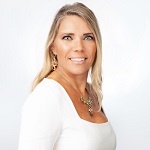 Christine Ricci, Associate Broker and founder of the Ricci Team at Keller Williams NY Realty, began her career in real estate at a very young age. Throughout her more than twenty years of service, she has maintained top producer status selling over a billion dollars worth of real estate in the Westchester County, NY, and Fairfield, Connecticut marketplace.
Christine Ricci, Associate Broker and founder of the Ricci Team at Keller Williams NY Realty, began her career in real estate at a very young age. Throughout her more than twenty years of service, she has maintained top producer status selling over a billion dollars worth of real estate in the Westchester County, NY, and Fairfield, Connecticut marketplace.
She does not quantify her success by income or the number of transactions, but the strength of the relationships she builds along the way. Customer service is at the forefront of everything she does and the reason her business is 78% repeat or referral based today.
Christine’s personality and work ethic earned her a reputation as one of the most trusted and admired real estate professionals in her area. She is passionate about connecting with people thus allowing her to build an incredible network of agents worldwide.
To meet the growing demand of her business and maintain a high level of service, she sought out and hand-selected other like-minded agents who share her passion, beliefs and work ethic, to form her highly successful team.
All of the sales associates are seasoned experts in the local market and have a specific role in the transaction. Like any well-oiled machine, many moving parts must work well together to accomplish a client’s goal. They aim to provide the ultimate client experience to remember for a lifetime.
Her global influence and fluency in Portuguese and Spanish contributed to building a robust international relocation division. With the addition of Italian and Greek, the team can now serve more international clients moving to and from Westchester County and Fairfield CT.
Their experience extends beyond the everyday real estate transaction and includes a full-service buyer and seller division, landlord and tenant division, and international relocation services.
